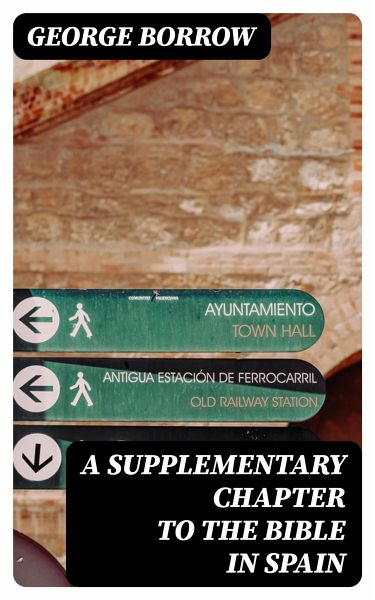
A Supplementary Chapter to the Bible in Spain (eBook, ePUB)
Versandkostenfrei!
Sofort per Download lieferbar
0,49 €
inkl. MwSt.
Weitere Ausgaben:

PAYBACK Punkte
0 °P sammeln!
In "A Supplementary Chapter to the Bible in Spain," George Borrow extends his remarkable exploration of the cultural and religious landscape of Spain, painting a vivid portrait of the nation's spiritual undercurrents through his characteristic narrative style that melds travel literature with an ethnographic approach. Borrow's keen observations of the Spanish populace, particularly the marginalized communities of the time, offer readers an intimate glimpse into the complexities of faith and identity. This book serves not only as a companion piece to his earlier work but also as an insightful c...
In "A Supplementary Chapter to the Bible in Spain," George Borrow extends his remarkable exploration of the cultural and religious landscape of Spain, painting a vivid portrait of the nation's spiritual undercurrents through his characteristic narrative style that melds travel literature with an ethnographic approach. Borrow's keen observations of the Spanish populace, particularly the marginalized communities of the time, offer readers an intimate glimpse into the complexities of faith and identity. This book serves not only as a companion piece to his earlier work but also as an insightful commentary on the impact of the Bible in a land shaped by both Catholicism and the remnants of its Protestant history. George Borrow (1803-1881), a renowned traveler, linguist, and author, was deeply influenced by his own experiences of religious fervor and cultural encounters during his time in Spain. His fluency in Spanish and insights into the local customs and beliefs allowed him to navigate the often-complicated interface between the diverse religious traditions that coexisted in the region. Borrow's passion for the search of truth through faith and his appreciation for cross-cultural dialogue imbue his writing with authenticity and fervor. This book is highly recommended for readers interested in religious studies, cultural history, or the intricacies of 19th-century travel narratives. Borrow's unique voice and immersive storytelling will transport you into the heart of a nation grappling with its multifaceted identity, making "A Supplementary Chapter to the Bible in Spain" a must-read for those seeking to understand the intersection of faith, culture, and history.
Dieser Download kann aus rechtlichen Gründen nur mit Rechnungsadresse in A, B, BG, CY, CZ, D, DK, EW, E, FIN, F, GR, H, IRL, I, LT, L, LR, M, NL, PL, P, R, S, SLO, SK ausgeliefert werden.













